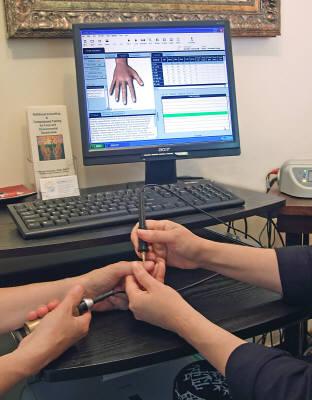How Compatible Are You With Your Teeth?
Holistic dentistry has long been on the leading edge for recognizing the potential problems toxic materials used in the mouth can present to a person’s overall health. This comes from a clear understanding of how the immune system functions, and knowing that every person’s body reacts differently based on how healthy their immune system may be at any given time.
The immune system will typically respond to non-compatible dental materials as if they were infections or ‘invaders’ by initiating a cascade of reactions geared toward eliminating that ‘invader’. A good analogy to this would be how your body reacts to a cold or flu by elevating levels of lymphocytes and activating the immune system, a reaction that eventually rids the body of the cold or flu. The difference is that with dental toxicity the source of the problem is permanently imbedded in the mouth, and therefore there is no way for the ‘infection’ to be eliminated by the immune system – but it will keep trying.
Keeping Your Immune System Happy
Every human body has a different capacity for identifying and eliminating toxins from the system. Because each person presents a unique body chemistry and state of wellness, it is important that materials to be used in the mouth by your dentist be screened to ensure bio-compatibility between the body and the immune system.
Since virtually anybody can have an immune reaction to most any material, one very good way to minimize the possibility of problems is to test the body beforehand for potential reactions to available materials – a variety of options that can range between 2,000 and 14,000 product choices. This is readily accomplished by three basic options:
- muscle response testing (Applied Kinesiology, CRA)
- electro galvanic skin response (Electro-Dermal Screening, EDS)
- blood tests (originally developed by Hal Huggins, DDS and Jess Clifford, PhD)
Muscle Response Testing (Applied Kinesiology, CRA)
Simply put, Applied Kinesiology is a non-invasive diagnostic tool used by your holistic dentist to determine bio-compatibility, simply on the basis of touch. By applying a simple test to your muscles without the use of probes, blood samples or x-rays the doctor can read a body and patients can give continuous feedback. Overall, applied kinesiology emphasizes prevention and focuses on whole body by recognizing three aspects of human health – structural, chemical, and mental.
By using kinesiology testing a dentist can quickly determine that a certain material may be incompatible with the patient’s physiology. This is accomplished simply by having the patient hold the material in his or her hand and ‘muscle testing’ (for example; the dentist presses down on the arm to see if an otherwise strong muscle will go a weak). The acting theory is that if the material presents a problem for the patient, the muscles in the arm will become weak and will not be able to resist the downward force, causing the patient to drop the arm being tested.
Ultimately a substance will induce a strong or weak reaction in a muscle only a few seconds after the patient is exposed to it, telling the dentist whether it is a bio-compatible fit or not.
Electro Galvanic Skin Response (Electro-Dermal Screening, EDS)

The goal of electro-dermal screening is to measure a direct or indirect biological response to material presented for testing by measuring the changes in the body’s energy flow. This test requires an understanding of energy medicine, the body’s meridians and is based on acupressure and biofeedback technology. These diagnostic elements are used to screen and detect sensitivities to a variety of materials and medicines. The technology itself is based on what is known as galvanic skin resistance using an ElectroDermal screening device.
The hand electrode on screening device is placed in the patient’s hand, while the stylus is stroked to the point of maximum deflection and a measurement pressure is put on the acupoint (acupressure point) that is being tested. By reading the fluctuations on the indicator dial the dentist is able to then determine a patient’s biocompatibility to nearly any substance presented for testing.
Blood Test
Serum compatibility testing can provide a dentist with the laboratory results that determine which materials react with a patient’s serum proteins, and to what extent this may happen. Proper testing can help to prevent the placement of any of a number of materials in the mouth that could prove to be an ongoing source of toxins to a patient.
This procedure involves sending a sample of the patient’s blood to a lab for analysis where technicians test the blood serum against thousands of dental products and materials to ascertain if they elicit an immune response or not. The most important consideration of this system is the amount of time it will take to get the results; up to two weeks. That is two weeks of delay before beginning a prescribed dental treatment. Consequently, serum compatibility testing may not be an option for every patient’s circumstance.
What We Test For
Since many people have sensitivities or allergies to materials commonly used in dentistry it is very important to conduct a compatibility test using any one of the above mentioned methods before proceeding with dental work. A general range of materials we test for may include;
- porcelain for crowns, fillings or veneers
- replacing metallic alloys for fillings
- composite resins for fillings and veneers
- porcelain fused to zirconia for crowns and bridges
Ultimately, the focus of holistic dental practice is to make as many biocompatible options available to our patients as possible. In cases where a patient may have a compromised immune system due to other health issues, we are especially concerned about achieving the highest level of biocompatibility. As always, be sure to talk to your dentist before having any procedure done, and to ensure your biocompatibility to any product that will be used to repair or restore you teeth.